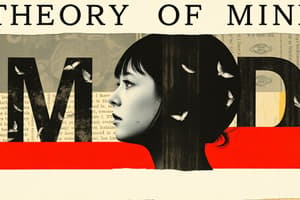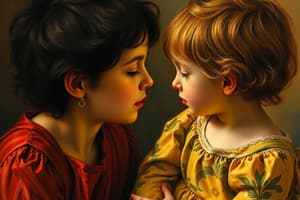Podcast
Questions and Answers
What is social cognition?
What is social cognition?
- Understanding human psychology (correct)
- Ability to read minds
- Thinking only about oneself
- None of the above
What does the Theory of Mind imply?
What does the Theory of Mind imply?
Understanding that people have mental states that guide their behavior.
The False Belief task is used to assess an aspect of Theory of Mind.
The False Belief task is used to assess an aspect of Theory of Mind.
True (A)
Provide an example of Theory of Mind.
Provide an example of Theory of Mind.
Which of the following are precursors to Theory of Mind? (Select all that apply)
Which of the following are precursors to Theory of Mind? (Select all that apply)
What is Desire Psychology?
What is Desire Psychology?
What is an example of Desire Psychology?
What is an example of Desire Psychology?
By age 4, children show understanding in Belief-Desire Psychology.
By age 4, children show understanding in Belief-Desire Psychology.
How do nonhuman primates relate to Theory of Mind?
How do nonhuman primates relate to Theory of Mind?
What role do mirror neurons play in social understanding?
What role do mirror neurons play in social understanding?
Is Theory of Mind a product of nature or nurture?
Is Theory of Mind a product of nature or nurture?
What does nurture provide in the context of Theory of Mind?
What does nurture provide in the context of Theory of Mind?
How do preschoolers primarily describe others?
How do preschoolers primarily describe others?
At what age do children's descriptions of others begin to reflect enduring psychological traits?
At what age do children's descriptions of others begin to reflect enduring psychological traits?
Flashcards are hidden until you start studying
Study Notes
Social Cognition
- Refers to the ability to comprehend human psychology, including perceptions, thoughts, emotions, motives, and behaviors.
- Encompasses understanding of self, others, groups, and entire social systems.
Theory of Mind
- Involves recognizing that individuals possess mental states that direct their actions and behaviors.
- Often described as "mind reading," as it seeks to grasp what is occurring inside another person's mind.
Theory of Mind (False Belief Task)
- A research method evaluating the capacity to understand that people can have incorrect beliefs that influence their behavior.
- Generally achieved by children around 4 years old, serving as a foundation for further social cognitive development.
Example of Theory of Mind
- A situation where a child understands that another individual, like Sally, will search for a marble in a basket where she mistakenly thinks it is located, instead of where it was moved.
Precursors to Theory of Mind
- Developmental milestones include joint attention (9 months), imitation (1st year), pretend play (1-2 years), intention understanding (1st year), emotional understanding, and deception.
Desire Psychology
- The initial form of theory of mind observed in toddlers at around 18 months, focusing on expressing wants to explain behaviors.
- Involves toddlers believing others want what they desire, showing early social cognition.
Desire Psychology Example
- A 14-month-old might give crackers to an adult wanting broccoli, misinterpreting the adult's desires, while 18-month-olds accurately infer and honor the preferences shown by emotional reactions.
Belief-Desire Psychology
- By age 4, children appreciate that both beliefs and desires influence behavior, leading to a realization that beliefs may not accurately reflect reality.
- Children can pass false belief tasks, showing they understand how beliefs, true or otherwise, affect actions.
Nature of Theory of Mind
- Refers to innate capabilities beneficial for social group functioning.
- Nonhuman primates exhibit basic theory of mind skills; development requires neurological and cognitive maturation.
Mirror Neurons
- Activated when performing an action and when observing the same action in others, aiding in interpreting behaviors through self-knowledge.
Example of Mirror Neuron Systems
- Observing someone reaching for a drink allows inferences about their thirst, and watching their reactions can evoke a similar emotional response through imitation.
Nature vs. Nurture in Theory of Mind
- Theory of mind develops through a combination of evolved skills, specific brain areas, and social experiences, requiring both neurological growth and interactions involving discussions of mental states.
Nurture Component
- Development hinges on interaction and environmental exposure, influenced by siblings and parents who engage in mental state conversations.
- Language is critical, and early social experiences foster an understanding of mental processes by prompting children to reflect on others' thoughts and feelings.
Describing and Evaluating Others (Preschool)
- Young children focus primarily on physical features, possessions, and activities to describe others.
- Use broad, evaluative psychological terms (e.g., "nice," "mean") rather than detailed personality traits.
Describing and Evaluating Others (School Age)
- Around ages 7 or 8, children's descriptions of others start reflecting a deeper understanding of enduring psychological traits.
- By age 10, children articulate descriptions based on consistent personality characteristics rather than superficial qualities.
Studying That Suits You
Use AI to generate personalized quizzes and flashcards to suit your learning preferences.




